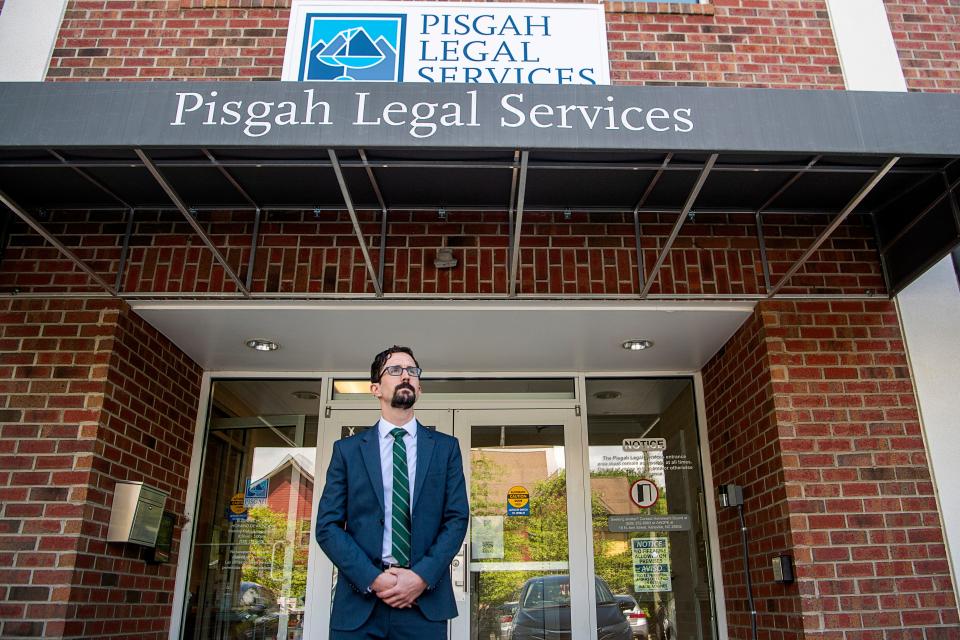Pisgah Legal loses federal grant funding, faces domestic violence survivor programming cut
- Oops!Something went wrong.Please try again later.
ASHEVILLE – A Western North Carolina legal aid organization may soon make significant cuts to its domestic violence survivor programming after losing funding from several federal grants.
Pisgah Legal Services provides free civil legal aid to low income WNC residents. It consults with clients to fight evictions, arrange health insurance and find protection from domestic violence.
For the 2024 calendar year, Pisgah Legal faces a $1 million funding gap previously filled by the federal Crime Victims Fund, Violence Against Women Act and American Rescue Plan, Pisgah Legal Executive Director Jim Barrett told the Citizen Times Dec. 27.
A plurality of the funding from these programs flowed to the organization’s domestic violence prevention services, Barrett said. To bridge this gap, Pisgah Legal and other organizations unsuccessfully lobbied Raleigh legislators. Now these organizations are turning to counties and donors for help, before turning to municipalities.

“A relatively small donation can pay for a few hours of legal work and really change people’s lives,” Barrett said. He said that ending domestic violence cycles can involve multiple steps including filing restraining orders, fighting custody battles and finding new housing.
“There are a lot of challenges for people to get away from abuse. We don’t want access to a lawyer to be one of those challenges.”
Pisgah Legal has already made some difficult financial decisions, with more looming. The legal aid service, which brought in $10.3 million in revenue in 2022, has been on a hiring freeze since August, Barrett said. It has open positions for one lawyer and at least two support staff that it cannot pay to fill.
Barrett told the Citizen Times that Pisgah Legal’s board voted for a budget for next year that does not include staff raises, even for cost-of-living increases. The budget, he said, reduces 401k matching that staff receives.
Pisgah Legal will not implement those changes until the spring, Barrett said, giving the organization a few months to fill the funding gaps.
Congress passed the Victims of Crime Act in 1984, which established the Crime Victims Fund. This provides funding for programs that offer support services for those affected by violent crimes. It is financed by fines and penalties paid by people convicted in federal cases.
President Joe Biden signed a bipartisan bill in July 2021 to bolster the fund and allow states to waive requirements for victim cooperation with law enforcement to access funding.
“This bill is going to allow us to make — make sure that all the fines and penalties that are from federal cases go into the victims — the Crime Victims Fund to rebuild this fund, because it’s badly needed,” Biden said at the time.
After the president signed that bill, the amount of funds available for organizations like Pisgah Legal increased by 29% to $2.6 billion for the 2022 fiscal year, according to the Office for Victims of Crime, which helps administrate the program.

Since then, the program has lost close to 54% of its available funding, leaving organizations like Pisgah Legal groveling for cash, and needing to make difficult cuts.
Pisgah Legal briefly used roughly $426,000 in ARPA funds to patch the shortfall. But that money, which became available July 2022, is now gone.
Barrett said that legal aid organizations in North Carolina collectively attempted to lobby Raleigh legislators, but additional state funding did not come. This funding request flows through the Justice and Safety Appropriations Committee, which shares the same name in each chamber.
Sen. Warren Daniel, who represents part of Buncombe, Burke and McDowell counties, and co-chairs that committee, did not respond to a Citizen Times Dec. 27 request for comment.
2023 County Manager Letter_Mitchell by Mitchell Black on Scribd
Barrett sent letters to 11 county managers earlier this month, including Buncombe’s Avril Pinder, requesting the county contract Pisgah Legal for its services and appeal to state legislators to fund this work.
“I am also asking each county’s commissioners to ask their state legislators to fund this work going forward, as early as the (fiscal year 2025) budget,” Barrett’s letter to Mitchell County Manager Allen Cook read.
More: 600,000 North Carolinians now have access to health insurance as expanded Medicaid begins
More: Conversation with Pulitzer Prize-winning author of 'Poverty, by America,' Matthew Desmond
More: Retired Asheville housing authority CEO to take over as interim director of Homeward Bound
The Citizen Times called Cook’s office, but it was closed for the holidays.
Barrett said that he would meet with Pinder, who received a similar letter, in the New Year.
Buncombe County spokesperson Kassi Day told the Citizen Times in a Dec. 28 email that the county contracts with Pisgah Legal to provide a wide range of legal services, including domestic violence legal assistance. Pinder, who is on vacation, was not available to comment.
People can make donations to Pisgah Legal at pisgahlegal.org/give. Donations will be matched up to $70,000 through the end of the year.
Mitchell Black covers Buncombe County and health care for the Citizen Times. Email him at mblack@citizentimes.com or follow him on Twitter @MitchABlack. Please help support local journalism with a subscription to the Citizen Times.
This article originally appeared on Asheville Citizen Times: Federal funding loss leads Pisgah Legal to make significant cuts

